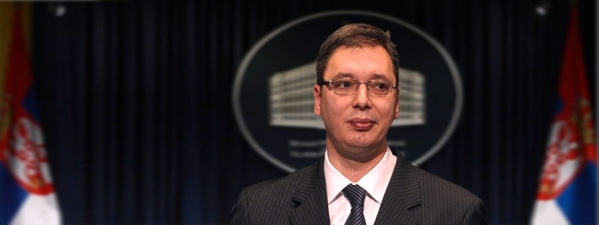
Serbian prime minister plans new privatization push after election
NOVI PAZAR, Serbia (Reuters) - Serbian Prime Minister Aleksandar Vucic plans a new push to privatize loss-making state firms if he wins Sunday's election and will do everything needed to secure IMF approval for his economic policies, he told Reuters in an interview.
Polls indicate Vucic will secure a new four-year term in the general election, called two years early after the conservative leader said he needed a fresh mandate to pursue reforms and to complete recently started talks on joining the European Union.
The International Monetary Fund, in its last review in February of Serbia's compliance with the terms of a 1.2 billion euro ($1.3 billion) loan, praised Belgrade's economic program but said big challenges remained to reduce the over-staffed public sector and restructure loss-making state firms.
Vucic said that, if his Progressive Party is re-elected, it would press ahead with reforms of state-owned companies.
"The situation is somewhat better but not enough. We also want to complete the process of privatization, speed up (private) investments and above all to spur the entrepreneurial spirit of the people," he said.
Vucic said he would do everything needed for a positive outcome when the IMF returns for its next review after the election.
"Without a positive IMF review it would be very difficult for me to be the prime minister," he said, speaking at the 12th century Djurdjevi Stupovi monastery in southwestern Serbia during a break in campaigning.
Vucic's attempts to privatize large state companies, many of which have bloated payrolls and big debts, met little success until this week when China's Hebei Iron & Steel agreed to buy a loss-making Serbian steel mill.
In December, Serbia rejected as too low all offers for a majority stake in telecoms provider Telekom Srbija, a decision Vucic later said he regretted.
The three big state firms that are leading candidates for privatization or downsizing are Telekom, the RTB Bor copper mining and smelting complex and the Resavica coal mine.
The government wants to avoid potentially heavy job losses.
"Telekom will be much easier (to tackle) than RTB Bor and Resavica, but we will be fighting for Bor and Resavica," Vucic said.
"Resavica will be toughest to tackle. RTB Bor will not be easy but I believe we can manage this and I believe RTB Bor can be a very successful company and that we will manage to salvage and keep most of the workers in Resavica," he said.
Vucic said he will fight resurgent ultra-nationalist parties if they get in to parliament on Sunday.
"That would not be the greatest news for the country because I am afraid that some would want to present us in the future as European or global lepers. That's the last thing Serbia needs," said Vucic, who broke with former nationalist colleagues in 2008 to adopt pro-EU policies.

